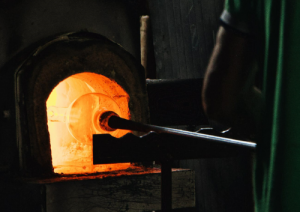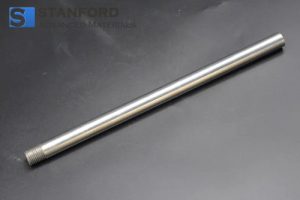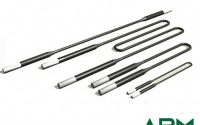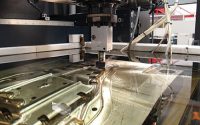Molybdenum Electrodes: Innovations in Glass Melting
Introduction:
In the ever-evolving landscape of industrial manufacturing, the glass industry stands out as a sector. Innovations play a crucial role in enhancing efficiency, quality, and environmental sustainability. One such breakthrough is the introduction and utilization of molybdenum electrodes in glass melting. Such development has significantly transformed traditional practices.

The Advent of Molybdenum in Glass Melting:
Traditionally, glass-melting furnaces relied on fossil fuels. These fuels posed challenges in terms of energy efficiency and environmental impact. The advent of electric glass melting furnaces, where molybdenum electrodes are prominently used, marked a significant shift.

Molybdenum is notable for its exceptionally high melting point and robustness in high-temperature environments. It emerged as an ideal material for electrodes in these furnaces.
Related reading: Molybdenum Electrodes For Glass Furnaces
Benefits in the Glass Melting Process:
The integration of molybdenum electrodes in glass melting furnaces has brought several advantages:
- High-Temperature Stability: Molybdenum can withstand temperatures above 2,600°C without melting or deforming. Such ability ensures that Mo can efficiently operate in the harsh environment of a glass furnace.
- Enhanced Glass Quality: The non-reactive nature of molybdenum with glass also stands out. It ensures that the final product is free from contaminants. That’s a critical factor in manufacturing high-purity glass for specialized uses.
- Energy Efficiency: Electric furnaces with Mo electrodes are more energy-efficient compared to their fossil-fuel counterparts. They can precisely control the melting process. Thus, we can enjoy reduced energy consumption and lower greenhouse gas emissions.
- Durability and Cost-Effectiveness: Mo electrodes offer remarkable durability. In this way, they can reduce the need for frequent replacements and thereby lower the operational costs over time.
- Environmental Impact: The shift to electric melting using Mo electrodes aligns with the global push towards sustainability. By reducing reliance on fossil fuels, this technology significantly cuts down on carbon emissions and other pollutants associated with traditional glass melting.
Innovations and Advancements:
Molybdenum electrodes extend beyond their conventional use in standard glass melting. Their unique properties have paved the way for innovative applications, particularly in the production of specialty glasses.
These specialty glasses are integral to various technological and scientific fields requiring consistency and purity.
1. Specialty Glass Production:
– Molybdenum electrodes are crucial in manufacturing high-purity glass, essential in electronics and optical industries. The controlled melting process ensures the elimination of impurities.
2. Optical and Laboratory Glass:
– In the production of optical fibers and laboratory glassware, molybdenum electrodes provide uniform heating. Such condition ensures the precise control needed for producing glass with specific optical properties.
3. Glass for Scientific Instruments:
– Scientific instruments, such as telescopes and microscopes, require glass with exact specifications. Mo electrodes facilitate the production of such specialized glass types.
4. Electronics Industry:
– The electronics industry benefits from the use of glass produced with molybdenum electrodes. These devices work well, particularly in the manufacturing of screens, lenses, and other components where clarity and purity are essential.
5. Solar Panels and Renewable Energy:
– In the renewable energy sector, particularly in solar panel production, glass quality directly impacts efficiency. The consistent and pure glass made possible by molybdenum electrodes is instrumental in this field.
6. Advanced Architectural Glass:
– Molybdenum electrodes are used in creating advanced architectural glass. Such glass requires a blend of aesthetic appeal and functional properties, such as thermal insulation and strength.
Industry Adoption and Case Studies:
Several leading glass manufacturers have adopted molybdenum electrodes. And, there are reporting improvements in production efficiency and product quality. Case studies from these companies highlight reduced energy costs, enhanced control over the melting process, and a notable decrease in maintenance and operational challenges.
Looking Ahead:
The future of glass melting with molybdenum electrodes is bright.
- Ongoing research focused on further enhancing their efficiency and sustainability.
- Challenges remain, such as managing costs and adapting to different types of glass production, but the potential for continued innovation is vast.
Conclusion:
Molybdenum electrodes have ushered in a new era in glass manufacturing with enhanced efficiency, superior product quality, and a reduced environmental footprint.
As the industry continues to innovate and evolve, the role of Mo electrodes in glass melting will undoubtedly expand. They are going to reinforce their status as a cornerstone of modern glass manufacturing technology.
Advanced Refractory Metals (ARM) stands as a global frontrunner in manufacturing and supplying molybdenum products. ARM offers top-quality molybdenum electrodes at highly competitive prices to its customers worldwide. Send us an inquiry if you are interested.



